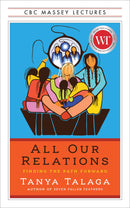Description
All Our Relations: Finding the Path Forward is the publication of Tanya Talaga's five speeches given as part of the CBC’s Massey Lecture Series. Tanya Talaga is the acclaimed author of Seven Fallen Feathers, which was the winner of the RBC Taylor Prize, the Shaughnessy Cohen Prize for Political Writing, and First Nation Communities Read: Young Adult/Adult. For more than twenty years she has been a journalist at the Toronto Star, and has been nominated five times for the Michener Award in public service journalism. She was also named the 2017–2018 Atkinson Fellow in Public Policy. Talaga is of Polish and Indigenous descent. Her great-grandmother, Liz Gauthier, was a residential school survivor. Her great-grandfather, Russell Bowen, was an Ojibwe trapper and labourer. Her grandmother is a member of Fort William First Nation. Tanya Talaga maintains that cultural genocide has led to a forced disconnection from land and language by Indigenous peoples. The need now, she says, is for Indigenous self-determination in social, cultural and political arenas. Many communities are finding that the road back to a relationship with land and language are keys to community healing and to what in fact it means to be Indigenous. Lecture 1 was held in Thunder Bay and discusses We Were Always Here. In this lecture she begins with a troubling account of Indigenous suicide and how colonization has completely failed. The second lecture in Halifax explored the connection to the land and how youth need to be reconnected to the land so they can find their identity and healing. The third lecture reveals the connection between youth suicide and identity and kinship and how the place known as the third space neither Indigenous nor white is a place where child abusers find vulnerable youth. Lecture 4 in Saskatoon called "I Breathe for Them" explores healthcare as a matter of social equity. The final lecture held in Toronto discusses We Are Not Going Anywhere because Indigenous peoples have been subjected to genocide in many places: Canada, Australia, Brazil, even the Arctic Circle. But Talaga points out that First Peoples have a history of resistance. Indigenous communities are demanding a political and moral authority over their own communities that they have historically been denied. This essential work of non-fiction highlights the author’s ability to draw parallels between the past and the present. Through storytelling, on-the-ground reporting, literature surveys, and plenty of statistics, Talaga demonstrates the extent to which Indigenous children continue to live under the full weight of colonial history. But her ongoing journalism and storytelling ensures that Canada and the world is now aware of the issues. Highly Recommended.


